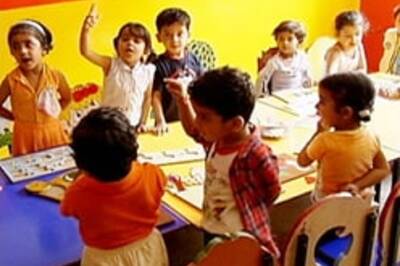
views
New Delhi: There will be no Class 10 board exams in CBSE schools from 2011 and students will get grades, the Government announced on Monday.
Class 10 students of in CBSE (Central Board of Secondary Education) schools will have to give board exams in 2010 but they will get grades and not marks, announced Union Human Resources Development Minister Kapil Sibal in New Delhi.
"Students who wish to evaluate themselves (on the board exam system) could do so on demand," he said at a press conference in New Delhi. "For all school children who will be moving to Class 11 from Class 10 in 2011 shall have no Board exam. But all school children who will be moving from Class 10 to Class 11 in 2010 shall have a board exam."
A grading system with A1, A2, B1, B2, C1, C2, D, E1 and E2 grades will be introduced in 2011. The nine-point scale, with A1 (exceptional) to E2 (unsatisfactory), is expected to take the fear of exams in schools.
"After the Board examination is abolished in 2011 (for Class X), students will have a choice to take the board exam on demand for transfer (to another school) or entry into pre-university institutes," Sibal said.
The exam on demand is also available to students who want to continue in the same school, he said. Under the new system, students who wish to continue in the same school after Class 10, need not take Board exam from 2011.
On the grading system, he said it will be a "continuous, comprehensive evaluation" which will be good for the students. However, along with grades, students can also ask for their percentile.
The new system will be based on nine-point scale,
starting from A1 (exceptional) up to E2 (unsatisfactory).
Grading procedure, which was finalised by a high-level committee headed by CBSE chairman Veenith Joshi, will warrant students to secure more than 33 per cent marks to get a certificate.
The nine-point scale will start from A1(with 91-100 marks, exceptional), A2(81-90, excellent), B1(71-80, very good), B2(61-70, good), C1(51-60, fair), C2(41-50, average), D(33-40, below average), E1(21-32, needs improvement) and E2(00-20, unsatisfactory).
"This is good system which will very well judge the potential of a student," Sibal said.
Continuous and Comprehensive Evaluation (CCE) system will be put in place from October this year for those who are completing class-X in 2011. The CCE refers to a system of school-based evaluation of students, covering all aspects of pupils' development.
It will cover the co-curricular activities, besides the core areas of subjects being studied in the classes. The CCE system will have two components -- formative assessment and summative assessment.
The formative assessment will be based on whole range of tests like interview, quiz, project work and practical assignments.
It takes care of scholastic as well as co-scholastic aspects of pupils' growth. The scholastic aspects include curricular areas or subjects specific areas, while co-scholastic aspects include life-skills, attitude and values, physical and health related activities.
"If the CBSE has only a continuous evaluation system, the state board might not accept the marks awarded by private schools. The choice should be given to the students either to do the board exam or follow the continuous evaluation system. I'm not sure how two systems can function in one school," said the principal of DAV boys school Dr Sathish.
















Comments
0 comment